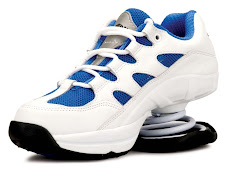 The idea that high heels can be hazardous to your health isn't new—orthopedists have warned women for years that high heels can contribute to the development of a variety of conditions from corns and calluses to hammertoes, arthritis, chronic knee pain, sprained ankles and back problems.
The idea that high heels can be hazardous to your health isn't new—orthopedists have warned women for years that high heels can contribute to the development of a variety of conditions from corns and calluses to hammertoes, arthritis, chronic knee pain, sprained ankles and back problems.In 1998, a team of Harvard researchers linked high heels and knee osteoarthritis, a painful, degenerative joint disease characterized by the breakdown of the cartilage surrounding the knee. In that study, D. Casey Kerrigan, MD, associate professor of physical medicine at Harvard Medical School, and her team looked at very narrow, stiletto heels.
Later, researchers decided to look at the chunkier heels now in fashion to determine if they too are harmful to women's knees. The study demonstrates that wide heels increase the risk of developing osteoarthritis in the knee as much as, or more than, thin-heeled stilettos.
"Wide-heeled shoes give you the perception of more stability when you're standing, and they feel comfortable, so women wear them all day long," Kerrigan said. "They are better for your feet than stiletto heels, but just as bad for your knees."
"It takes a long time to feel the effects of knee osteoarthritis, and once you do, it's too late," said Dr. Kerrigan.
Eighty percent of the 42 million Americans suffering from arthritis have osteoarthritis, in which joint cartilage and surrounding bone progressively degrade from wear and tear. Surgeons perform over 300,000 artificial knee replacements in this country every year due to this condition.
High heels can also result in a variety of other foot problems, including metatarsalgia, which is pain in the ball of the foot. Another condition, called Morton's neuroma, which is 10 times more common in women than men, is caused by a thickening of tissue around a nerve between the third and fourth toes. It usually develops in response to irritation and excessive pressure such as the weight burden high heels place on the ball of the foot. Pointed toe shoes and shoes that pinch lead to other foot problems such as bunions, calluses and hammertoe.
Information from the Health Library at the Yale-New Haven Hospital

No comments:
Post a Comment